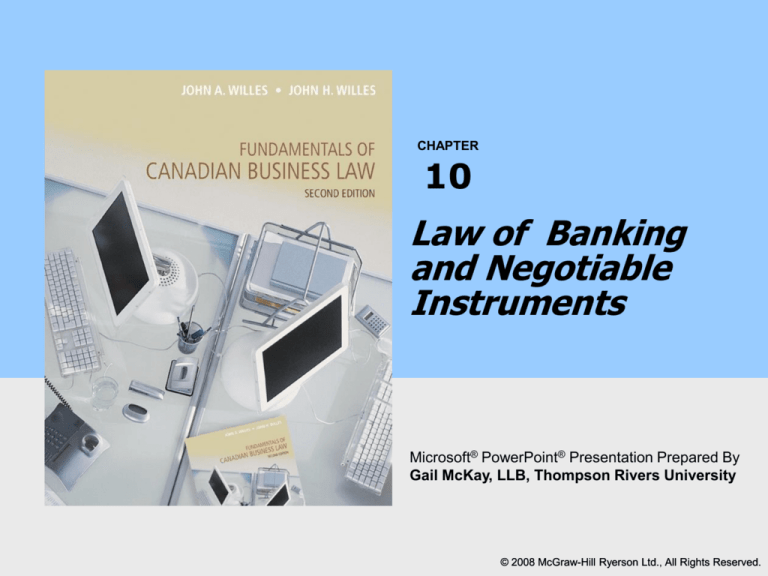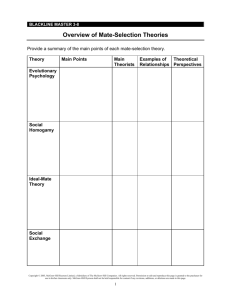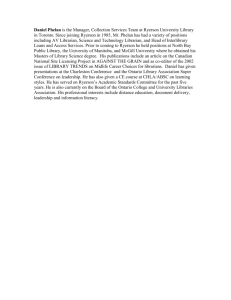
CHAPTER
10
Law of Banking
and Negotiable
Instruments
Microsoft® PowerPoint® Presentation Prepared By
Gail McKay, LLB, Thompson Rivers University
© 2008 McGraw-Hill Ryerson Ltd.
Ltd., All Rights Reserved.
OBJECTIVES
1. To survey the role of cheques, bills of
exchange and promissory notes in business
and the law relating to them
2. To determine the enforceability of these
negotiable instruments and defences to
their payment
3. To survey the effect of consumer protection
legislation on negotiable instruments
Fundamentals of Canadian Business Law, Second Edition
© 2008 McGraw-Hill Ryerson Ltd. All Rights Reserved
10-1
INTRODUCTION
A negotiable instrument is an instrument in
writing that, when transferred in good faith
and for value without notice of defects, passes
a good title to the instrument to the transferee
It replaces the need for an exchange of cash
(legal tender) for goods or services in business
transactions
Cheques, bills of exchange and promissory
notes are the most common negotiable
instruments
Fundamentals of Canadian Business Law, Second Edition
© 2008 McGraw-Hill Ryerson Ltd. All Rights Reserved
10-2
THE BILLS OF EXCHANGE ACT
The federal Bills of Exchange Act charts the
role of negotiable instruments in creating credit
arrangements and reducing risk by replacing
the need to transport cash
A bill of exchange is defined as an instrument
in writing, signed by the drawer and addressed
to the drawee, ordering the drawee to pay a
certain sum of money to the payee (or bearer)
at a fixed or determinable future time, or on
demand
Fundamentals of Canadian Business Law, Second Edition
© 2008 McGraw-Hill Ryerson Ltd. All Rights Reserved
10-3
NEGOTIABLE INSTRUMENTS
An endorser and endorsee are, generally,
the equivalents of an assignor and assignee of
contractual rights
The holder of a negotiable instrument must be
a bearer, a payee, or an endorsee
A holder for value is someone who has paid
something of value in return for the negotiable
instrument, as opposed to someone who has
received it as a gift
Fundamentals of Canadian Business Law, Second Edition
© 2008 McGraw-Hill Ryerson Ltd. All Rights Reserved
10-4
A HOLDER IN DUE COURSE
If
1.
2.
3.
a holder has received an instrument that is
Complete and regular on its face,
Before it is due and payable,
Without any knowledge that it has
previously been dishonoured, and the
holder
4. Has taken the instrument in good faith and
for value, and
5. Has had no notice of any defect in the title
of the person who negotiated it,
then the holder is a holder in due course
Fundamentals of Canadian Business Law, Second Edition
© 2008 McGraw-Hill Ryerson Ltd. All Rights Reserved
10-5
CHEQUES
A cheque is a special type of bill of exchange,
payable on demand, in which the drawee is
always a bank
However, the bank is only required to honour
an ordinary cheque if the drawer has enough
money on deposit to cover the cheque
Certification of a cheque requires a bank to
withdraw the amount of a cheque from the
drawer’s account and set it aside for future
payment, thereby making the bank liable
Fundamentals of Canadian Business Law, Second Edition
© 2008 McGraw-Hill Ryerson Ltd. All Rights Reserved
10-6
PRESENTATION AND ENDORSEMENT
Cheques should be presented for payment
within a reasonable time
A restrictive endorsement limits payment to a
named person or “for deposit only” into a
named person’s account
A special endorsement requires a specific
endorser before further negotiation can occur
Endorsement without recourse limits the
liability of the endorser if dishonour arises
Fundamentals of Canadian Business Law, Second Edition
© 2008 McGraw-Hill Ryerson Ltd. All Rights Reserved
10-7
Fundamentals of Canadian Business Law, Second Edition
© 2008 McGraw-Hill Ryerson Ltd. All Rights Reserved
10-8
BILLS OF EXCHANGE
Still used in international business for the
purchase and sale of goods, the bill of
exchange is not as common as it once was, but
is an excellent way to sell goods on credit
The drawer is the person who writes a bill of
exchange or order to pay, and the drawee is
the person to whom it is addressed
An acceptor is a drawer who accepts liability
for payment of the bill of exchange
Fundamentals of Canadian Business Law, Second Edition
© 2008 McGraw-Hill Ryerson Ltd. All Rights Reserved
10-9
DEMAND AND SIGHT BILLS OF EXCHANGE
The timing for payment of bills of exchange
is subject to certain rules
A demand bill is payable on demand or upon
presentation of the bill of exchange and does
not require any acceptance
A sight bill, on the other hand, is generally
payable three days after the acceptance has
occurred
Fundamentals of Canadian Business Law, Second Edition
© 2008 McGraw-Hill Ryerson Ltd. All Rights Reserved
10-10
LIABILITY FOR A BILL OF EXCHANGE
Where acceptance by the drawee has
occurred, the drawee is liable to pay at the
specified time and place or at a reasonable
time
If payment is refused, the holder of a bill of
exchange can, after giving them notice of the
dishonour and an opportunity to pay, sue the
drawer, acceptor and endorsers
The notice should be given not later than the
next business day following the dishonour
Fundamentals of Canadian Business Law, Second Edition
© 2008 McGraw-Hill Ryerson Ltd. All Rights Reserved
10-11
Fundamentals of Canadian Business Law, Second Edition
© 2008 McGraw-Hill Ryerson Ltd. All Rights Reserved
10-12
PROMISSORY NOTES
A promissory note is an unconditional
promise in writing, signed by the maker, to
pay a certain sum of money to the person
named or to the bearer at a fixed or
determinable future time, or on demand
A promissory note differs from a bill of
exchange and a cheque because it is a promise
rather than an order to pay, and there is no
drawee involved; but once delivered to the
payee or bearer, the maker is liable to pay the
note according to its terms
Fundamentals of Canadian Business Law, Second Edition
© 2008 McGraw-Hill Ryerson Ltd. All Rights Reserved
10-13
PROMISSORY NOTES continued
A promissory note held as collateral need
not be presented for payment so long as it is
continuing to be held for that purpose
The calculation of time for payment, as with a
bill of exchange, includes three days’ grace
unless the note is payable on demand
If a promissory note is dishonoured, the holder
must immediately give notice of the dishonour
to all endorsers
Fundamentals of Canadian Business Law, Second Edition
© 2008 McGraw-Hill Ryerson Ltd. All Rights Reserved
10-14
Fundamentals of Canadian Business Law, Second Edition
© 2008 McGraw-Hill Ryerson Ltd. All Rights Reserved
10-15
INSTALLMENT NOTES
Some promissory notes allow for payment
by a number of installment payments
The seller of expensive consumer goods may
take a security interest in the goods as
collateral security to a promissory note
Alternatively, a seller of such goods may
specify that title to the goods will not pass until
the final payment is made
Fundamentals of Canadian Business Law, Second Edition
© 2008 McGraw-Hill Ryerson Ltd. All Rights Reserved
10-16
ADVANTAGES OF INSTALLMENT NOTES
The buyer of goods on installment may
spread the cost of expensive purchases over a
pre arranged period of time
But the seller benefits from the fact that the
installment note is a negotiable instrument,
meaning it can be negotiated to a financial
institution which will receive the payments
from the consumer, while the seller is paid
immediately
Fundamentals of Canadian Business Law, Second Edition
© 2008 McGraw-Hill Ryerson Ltd. All Rights Reserved
10-17
ACCELERATION CLAUSES
When installment notes are designed, a
common requirement is that if a default in the
payments occurs, the entire remaining balance
becomes due and payable
Without the acceleration clause, the institution
handling the credit transaction could only sue
for missed payments as they arose – which
would not provide the same dis-incentive to
miss payments
Fundamentals of Canadian Business Law, Second Edition
© 2008 McGraw-Hill Ryerson Ltd. All Rights Reserved
10-18
Fundamentals of Canadian Business Law, Second Edition
© 2008 McGraw-Hill Ryerson Ltd. All Rights Reserved
10-19
DEFENCES TO CLAIMS FOR PAYMENT
According to the Bills of Exchange Act, if a
default occurs on a negotiable instrument,
prior endorsers must indemnify subsequent
endorsers, with liability following the order of
signing
In comparison, an ordinary assignee of a
contractual right assumes the rights of the
assignor, subject to any defects in the title of
the assignor – such as undue influence, fraud
or a right of set off against the assignor
Fundamentals of Canadian Business Law, Second Edition
© 2008 McGraw-Hill Ryerson Ltd. All Rights Reserved
10-20
RIGHTS OF A HOLDER IN DUE COURSE
When the holder of a negotiable instrument
meets the qualifications of a holder in due
course (including receiving the instrument for
value and without notice of defects either in
the instrument itself or the title of the prior
holder), then he or she can enforce the
instrument against all prior parties
This is the case despite the existence of any
problems between the original parties except
forgery or the lack of capacity of the maker
Fundamentals of Canadian Business Law, Second Edition
© 2008 McGraw-Hill Ryerson Ltd. All Rights Reserved
10-21
THREE CLASSES OF DEFENCES
Real defences are those which go to the root
of the negotiable instrument and are effective
against all holders, including a holder in due
course
Forgery of the signature of the maker, drawer
or endorser of a negotiable instrument is a real
defence, as is the signature of a minor
If an instrument is signed but incomplete, and
if it not delivered, then these two missing
elements together constitute a real defence
Fundamentals of Canadian Business Law, Second Edition
© 2008 McGraw-Hill Ryerson Ltd. All Rights Reserved
10-22
CLASSES OF DEFENCES, continued
A material alteration to a negotiable
instrument also provides a real defence insofar
as the altered portions of the document are
concerned, unless the drawer was negligent
Similarly, a cancellation of the negotiable
instrument which is clearly apparent on its face
provides a real defence against payment to a
holder
Fundamentals of Canadian Business Law, Second Edition
© 2008 McGraw-Hill Ryerson Ltd. All Rights Reserved
10-23
DEFECT OF TITLE DEFENCES
In contrast to real defences, defect of title
defences do not apply to a holder in due course
although they are effective against other
holders
Examples of defect of title defences include
fraud, breach of trust, duress, undue influence,
consideration that is illegal or a failure of
consideration, the theft of a negotiable
instrument in completed form, or the absence
of delivery of an instrument
Fundamentals of Canadian Business Law, Second Edition
© 2008 McGraw-Hill Ryerson Ltd. All Rights Reserved
10-24
PERSONAL DEFENCES
A personal defence is one that is limited to
an immediate party, and not against a remote
party
An example is the set off, which allows one
party to raise as a defence the indebtedness of
the party presently claiming payment
Other personal defences are release or
payment prior to maturity
Fundamentals of Canadian Business Law, Second Edition
© 2008 McGraw-Hill Ryerson Ltd. All Rights Reserved
10-25
CONSUMER PROTECTION
The Bills of Exchange Act has two rules
associated with the protection of consumers
against defective goods purchased on a credit
arrangement
Consumer bills are bills of exchange which are
post dated for more than 30 days to purchase
consumer goods; and consumer notes are
promissory notes used to purchase consumer
goods
Fundamentals of Canadian Business Law, Second Edition
© 2008 McGraw-Hill Ryerson Ltd. All Rights Reserved
10-26
CONSUMER PROTECTION, continued
These two instruments must be marked
“consumer purchase” before or at the time that
each type of document is signed; otherwise the
document is void against all but a holder in
due course
Fundamentals of Canadian Business Law, Second Edition
© 2008 McGraw-Hill Ryerson Ltd. All Rights Reserved
10-27
Fundamentals of Canadian Business Law, Second Edition
© 2008 McGraw-Hill Ryerson Ltd. All Rights Reserved
10-28
SUMMARY
The Bills of Exchange Act governs the
negotiability of cheques, bills of exchange and
promissory notes
Liability for dishonour of a negotiable
instrument depends on whether defences are
real defences, defects of title or personal
defences
Consumer bills and consumer notes must be
specially marked “consumer purchase”
Fundamentals of Canadian Business Law, Second Edition
© 2008 McGraw-Hill Ryerson Ltd. All Rights Reserved
10-29




